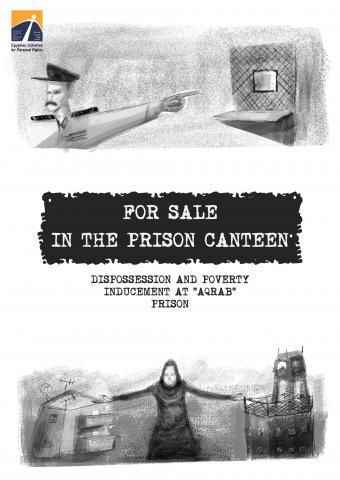
Egypt’s economic exploitation of prisoners
The Egyptian Initiative for Personal Rights (EIPR) published a report addressing the deepening marketization of prison life. The report, “For Sale in the Prison Canteen “Aqrab” Prison” shows how the most basic needs of prisoners, that should be provided for by the prison authorities by law, are sold at exorbitant prices for the sake of canteen’s profits.
The report focuses mainly on one prison in Egypt, the ‘Aqrab’ (scorpion) prison, which is a maximum-security prison that is notorious for its abuses and human rights violations. The focus on Aqrab prison, according to EIPR, is to make visible trends in Egypt’s prison system, while highlighting the economic exploitation of prisoners in Aqrab.\
The report is structured into three chapters. The first, links Egypt’s economic policies as influenced by a loan by the International Monetary Fund (IMF) and how that has economically impacted life in prisons. This chapter traces the local and global history of prison austerity, and how the acute inflation caused by the IMF loan is experienced by prisoners and their families, situating this within the historical context of austerity measures. The second chapter focuses on the general trends of abuses within the prison. The third, and final, chapter asserts that the economic exploitation taking place at the prison is another form of abuse suffered by inmates and perpetrated by the prison authorities. EIPR sees that these trends amount to intentional poverty-inducement by the Ministry of Interior against the population of the Aqrab prison.
In conclusion, the report puts forward several recommendations, including:
-
The Ministry of Interior to ensure that the prison facilities applies its regulations which thoroughly dictates the meal content and proportions that prisoners are entitled to free of charge to ensure healthy food and clean water provisions and conditions for prisoners;
-
The prison administration to provide all prisoners with a minimum set of bedding, clothes, and personal hygiene products as mandated by the law;
-
The Ministry of Interior to amend Decree 468/2017 to stipulate that prices of items sold in the prison canteen and/or cafeteria, where prisoners can resort to in order to complement the food provided by the prison, should not abusively and exploitatively exceed market prices and to require that these prices be disclosed by the ministry on a monthly basis on their website, upon request, and at all inspection visits by prosecutors and the National Council for Human Rights;
-
The Parliament to amend prison organization laws to stipulate that prison administrations cannot ban relatives from delivering the food, clothing, or medical, items that may be available for sale in the canteen during visits and to stipulate what exactly can and cannot be allowed to be delivered during visits
-
The Public Prosecutor to perform its duty to inspect prisons at least once a month and to thoroughly and seriously investigate their findings and report them to the general public;
-
The Parliament to pass an amendment to Law 94 of 2003 regulating the National Council for Human Rights that will allow the council to conduct unannounced visits to detention sites, intervene in lawsuits, and file complaints to the public prosecution;
For more information on the report, please visit here
